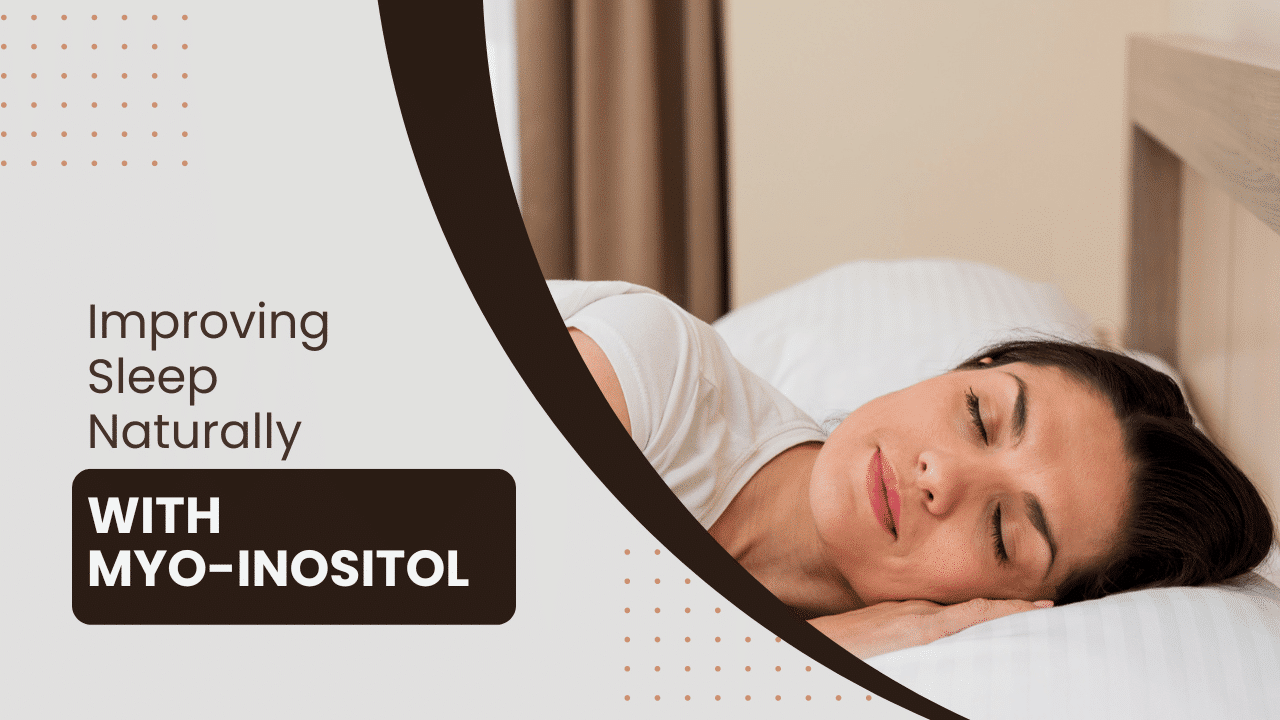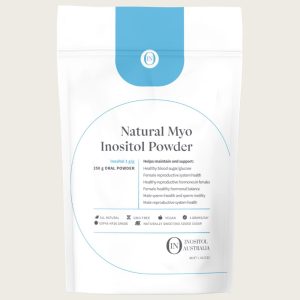Inositol, otherwise known as Vitamin B8, is a type of sugar alcohol that plays crucial roles in many bodily processes. There are several forms of inositol, but the most common type is myo-inositol. It’s present in a variety of foods, including fruits, beans, grains, and nuts. Many people take myo-inositol supplements for various health benefits, but there’s a growing interest in one benefit in particular: improved sleep.
If you find yourself struggling to fall asleep, stay asleep, or feel alert during the day, myo-inositol can help. While it’s well-known for supporting ovarian health and cycle regularity, recent studies suggest that inositol could play a role in enhancing our sleep quality.
Keep on reading to know more!
Does Myo Inositol Improve Sleep?
In a study examining the effects of inositol on sleep, researchers found that participants who took an inositol supplement experienced improved sleep quality and reduced time to fall asleep.
The mechanism behind inositol’s potential sleep-supportive properties might be linked to its role in neurotransmitter signalling. Neurotransmitters are vital for brain function, and imbalances can affect sleep quality.
Since inositol plays a part in neurotransmitter processes, its supplementation can help balance these levels, possibly leading to better sleep.
Furthermore, a separate study explored inositol’s role in managing circadian rhythms, which are our internal body clocks governing sleep-wake cycles. Findings suggested that inositol might help in “resetting” our circadian rhythms, particularly beneficial for those experiencing jet lag or working in shift patterns.
Ready to Transform Your Sleep Routine?
Discover the potential benefits of Myo Inositol for yourself. Embrace a natural approach to improving your overall well-being by incorporating Myo Inositol into your daily regimen. Take the first step towards better sleep, enhanced mood, and balanced hormones.
Buy Myo Inositol Powder today and start your journey towards a healthier, more rested you.
How Does Inositol Work?
Inositol is vital for cell membrane health, helps transmit signals between cells, and plays a role in fat transport.
In addition, it’s involved in the function of neurotransmitters, which are chemicals that allow our nerve cells to communicate. Due to its wide range of functions, inositol supplements are sometimes taken for various health concerns, from mental health issues to blood sugar regulation.
Types of Inositol
|
Type |
Functions |
|
The parent ingredient of all other inositol isomers converted in a one way process by the body. Supports neurotransmitter signalling, Helps with PCOS, skin acne, blood sugar, and sleep. Essential for cell membrane health. |
|
|
D-Chiro-Inositol |
Aids insulin signal transduction. |
|
Scyllo-Inositol |
Potential neuroprotective properties. |
|
Pinitol |
Modulates insulin function. |
Circadian Rhythms
Circadian rhythms are essentially our body’s internal clock, driving the routine physical, mental, and behavioural processes we undergo in a 24-hour cycle. But why are they so essential for our overall well-being?
At its core, the circadian rhythm is our body’s natural response to the cycle of day and night. It’s like an internal timekeeper that’s wired into our system, ensuring our body functions are in sync with the world around us.
The magic behind this rhythm lies in the hypothalamus, a tiny portion of our brain. This part receives information from our eyes about the surrounding light levels and then conveys that to different organs and tissues. As a result, our body instinctively knows when to gear up for the day and when to wind down for restful sleep.

Factors Disrupting Circadian Rhythms
The magic behind this rhythm lies in the hypothalamus, a tiny portion of our brain. This part receives information from our eyes about the surrounding light levels and then conveys that to different organs and tissues. As a result, our body instinctively knows when to gear up for the day and when to wind down for restful sleep.
Importance of Good Sleep
While the importance of sound sleep is self-explanatory, many key processes take place in our system when we fall asleep. Without these, it would become hard to function properly, and we would eventually fall sick.
- Restoration: Sleep is the time when our body repairs, regenerates, and recovers.
- Memory Consolidation: It aids in processing information, storing memories, and improving concentration.
- Emotional Well-being: Adequate sleep is crucial for emotional balance and mental health.
- Immune Boost: It helps bolster our immune system, making us less susceptible to illnesses.
- Healthy Metabolism: Sleep plays a role in regulating hunger hormones, impacting weight management and appetite.

Inositol and Sleep: How Are They Connected?
The brain’s neurotransmitter system is at the heart of our sleep-wake cycle, mood regulation, and overall cognitive functioning. Inositol, interestingly, impacts this system directly. Inositol is a precursor to certain secondary messenger systems inside nerve cells.
These systems are responsible for transmitting the effects of neurotransmitters from the outer cell membrane to the cell’s functional interior. One of the neurotransmitters affected by inositol is serotonin, a key mood-regulating neurotransmitter.
Serotonin plays a crucial role in mood and anxiety regulation, but it’s also a precursor to melatonin, the hormone responsible for regulating our sleep-wake cycle. In a nutshell, the higher the serotonin levels, the higher the melatonin levels, and vice versa. By influencing serotonin, inositol indirectly affects melatonin production, which is paramount for initiating and maintaining sleep.
How Does Myo-Inositol Help You Sleep: Step-by-step
- Neurotransmitter Regulation: As mentioned earlier, inositol helps in the transmission of neurotransmitter signals. By maintaining a balance of neurotransmitters, especially serotonin, inositol can set the stage for a restful night.
- Inducing Calmness: Anxiety and stress are two primary enemies of sleep. The role of inositol in promoting a calm and relaxed mind, mainly by modulating neurotransmitter pathways, can’t be understated. This relaxation can make it easier for individuals to drift off to sleep.
- Supporting Melatonin Production: By influencing serotonin levels, inositol indirectly affects melatonin production. Higher melatonin levels in the evening signal to our body that it’s time to wind down and prepare for rest.
Other Benefits of Inositol
- Mood Regulation: Supports neurotransmitter processes, potentially helping in mood balance and reducing symptoms of depression.
- Blood Sugar Control: Helps improve insulin sensitivity, beneficial for managing conditions like metabolic syndrome.
- Supports Ovarian Health: Especially beneficial for women with polycystic ovary syndrome (PCOS) by helping with regular menstrual cycles and improving ovarian function.
- Neurotransmitter Production: Influences the production of neurotransmitters, aiding in better cognitive and neural functions.
- Reduces Anxiety Symptoms: May offer relief for certain anxiety disorders, including panic attacks and obsessive-compulsive disorder (OCD).
- Fertility Support: Can enhance egg quality and support overall reproductive health.
Other Ways to Improve Sleep
While inositol for sleep is a relatively new application, here are some more traditional techniques, supplements, and tips to complement your sleep:
- Melatonin Supplements: Melatonin is naturally produced in the body and can be taken as a supplement to regulate the sleep-wake cycle, especially for jet lag or shift work.
- Valerian Root: An herbal supplement that has been used for centuries to treat various ailments, including sleep disorders.
- Magnesium: This mineral can promote relaxation and improve sleep quality, especially in those with insomnia.
- Lavender Oil: Inhalation or topical application can reduce anxiety and promote sleep. Consider using a lavender-scented diffuser in the bedroom.
- Limit Caffeine Intake: Reducing or eliminating caffeine, especially in the evening, can help improve sleep onset and quality.
- Consistent Sleep Schedule: Going to bed and waking up at the same time every day helps regulate your body’s internal clock.
- Dark and Cool Bedroom: A dark, quiet, and cool environment can aid sleep. Consider blackout curtains and setting the thermostat to around 65°F (18°C).
- Limit Screen Time: Blue light from screens can interfere with melatonin production. Use blue light filters or reduce screen time at least an hour before bed.
- White Noise Machines: These can mask disruptive background noises, creating a consistent auditory environment conducive to sleep.
- Relaxation Techniques: Activities like meditation, deep breathing exercises, and progressive muscle relaxation can reduce anxiety and promote sleep.
- Limit Nap Duration: If you nap during the day, keep it short (20-30 minutes) to prevent nighttime sleep disturbances.
- Exercise Regularly: Regular physical activity can help you fall asleep faster and enjoy deeper sleep, but avoid vigorous activity close to bedtime.
- Limit Fluids Before Bed: This can reduce the need for middle-of-the-night bathroom trips.
- Bedtime Rituals: Engaging in calming activities like reading a book or taking a warm bath can signal the body it’s time to wind down.
- Chamomile Tea: Known for its calming properties, chamomile tea can be a relaxing bedtime beverage.

Embrace Restful Nights with Myo-Inositol
Sleep is a cornerstone of our well-being, impacting our mental, emotional, and physical health. Myo-Inositol has emerged as a promising natural sleep enhancer, helping you achieve the restful nights you deserve.
As you consider incorporating myo-inositol or any other natural remedies into your routine, always remember to listen to your body and consult with health professionals to ensure you’re on the right path. Here’s to brighter mornings, rejuvenated days, and the simple joy of a good night’s sleep.
Sweet dreams await!
Resources
Mashayekh-Amiri S, Delavar MA, Bakouei F, Faramarzi M, Esmaeilzadeh S. The impact of myo-inositol supplementation on sleep quality in pregnant women: a randomized, double-blind, placebo-controlled study. J Matern Fetal Neonatal Med. 2022 Sep;35(18):3415-3423. doi: 10.1080/14767058.2020.1818225. Epub 2020 Sep 15. PMID: 32933356.
D’Anna R, Santamaria A, Giorgianni G, Vaiarelli A, Gullo G, Di Bari F, Benvenga S. Myo-inositol and melatonin in the menopausal transition. Gynecol Endocrinol. 2017 Apr;33(4):279-282. doi: 10.1080/09513590.2016.1254613. Epub 2016 Dec 2. PMID: 27910708.
Cowan S, Lim S, Alycia C, Pirotta S, Thomson R, Gibson-Helm M, Blackmore R, Naderpoor N, Bennett C, Ee C, Rao V, Mousa A, Alesi S, Moran L. Lifestyle management in polycystic ovary syndrome – beyond diet and physical activity. BMC Endocr Disord. 2023 Jan 16;23(1):14. doi: 10.1186/s12902-022-01208-y. PMID: 36647089; PMCID: PMC9841505.
Urrila, Anna S., Antti Hakkarainen, Anu E. Castañeda, Tiina Paunio, Mauri Marttunen and Nina Lundbom. “Frontal Cortex Myo-Inositol Is Associated with Sleep and Depression in Adolescents: A Proton Magnetic Resonance Spectroscopy Study.” Neuropsychobiology 75 (2017): 21 – 31.



